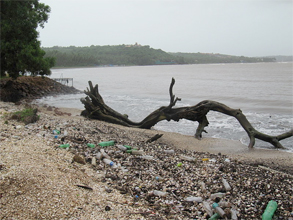Giant piles of plastic floating in the ocean might not be what most people think of when they hear the phrase “built environment”… but hey, we built it!
Turns out that this “plastisphere” has it’s own microbiome, distinct from the seawater around it. Not surprisingly of course, but cool that someone is looking. Abstract below, the paper itself is sadly not open access.
Plastics are the most abundant form of marine debris, with global production rising and documented impacts in some marine environments, but the influence of plastic on open ocean ecosystems is poorly understood, particularly for microbial communities. Plastic marine debris (PMD) collected at multiple locations in the North Atlantic was analyzed with scanning electron microscopy (SEM) and next-generation sequencing to characterize the attached microbial communities. We unveiled a diverse microbial community of heterotrophs, autotrophs, predators, and symbionts, a community we refer to as the “Plastisphere”. Pits visualized in the PMD surface conformed to bacterial shapes suggesting active hydrolysis of the hydrocarbon polymer. Small-subunit rRNA gene surveys identified several hydrocarbon-degrading bacteria, supporting the possibility that microbes play a role in degrading PMD. Some Plastisphere members may be opportunistic pathogens (the authors, unpublished data) such as specific members of the genus Vibrio that dominated one of our plastic samples. Plastisphere communities are distinct from surrounding surface water, implying that plastic serves as a novel ecological habitat in the open ocean. Plastic has a longer half-life than most natural floating marine substrates, and a hydrophobic surface that promotes microbial colonization and biofilm formation, differing from autochthonous substrates in the upper layers of the ocean.

New at #microBEnet: “Life in the “Plastisphereâ€: Microbial Communities on Plastic Marine Debrisâ€: Giant piles … http://t.co/HwEDiJnSg7
RT @Dr_Bik: New at #microBEnet: “Life in the “Plastisphereâ€: Microbial Communities on Plastic Marine Debrisâ€: Giant piles … http://t.co/J…